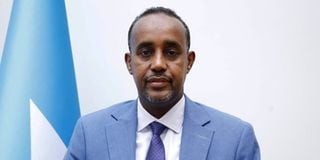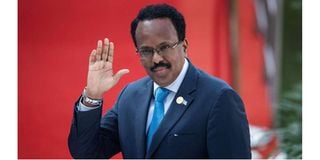Premium
Somalia PM Roble contradicts President Farmaajo as rift grows

Somalia's Prime Minister Mohamed Hussein Roble.
Somalia’s Prime Minister Hussein Roble on Sunday countered a presidential ban on foreign agreements during the electioneering period, instead suggesting that the executive arm of the government continue to perform its full duties.
It came a day after his boss, President Mohamed Farmaajo issued a decree banning Somali government institutions from entering into deals or MoUs with foreign sides during the election season.
“This decree suspends, until elections are held, the state institutions including the executive and other institutions, from entering agreements with other countries, institutions and international companies,” he said.

Somalia's President Mohamed Abdullahi Mohamed Farmaajo.
But in a contradiction of this directive, PM Roble instructed all institutions to continue serving the nation under the provisional constitution and laws of the state.
In a statement, government spokesman Mohamed Ibrahim Moalimu said the premier wants government business to continue as usual.
“The provisional constitution grants the Council of Ministers full authority until the ongoing elections generate a new government,” he said.
Citing Article 103 of the constitution, PM Roble insisted that his government had the authority to enter into agreements during the election season until a new government takes over.
“The government is fully responsible for enforcing the law, maintaining security, protecting the interests of the country and the people of Somalia,” he said.
“The national constitution mandates the government to negotiate with foreign entities on aid, trade, treaties or other issues that are important for our international relations and agreements.”
“The executive power of the Federal Republic is vested in the Council of Ministers according (to) Article 97, Clause 1 of the provisional constitution… The (provisional) constitution grants the cabinet the highest authority,” added Roble’s statement.
Famaajo’s decree forbade state institutions including the executive and the government from entering into agreements with other countries, institutions and international companies. It also forbade talks that could impact the future of Somalia, its sovereignty and territorial boundaries.
“No commercial agreements can be entered with foreign parties in the course of the election season,” it stated.
The decree had referred to a press statement by Villa Somalia, the presidential palace in Mogadishu, released on January 19, 2018, limiting the powers to exercise public-sector contracts, concessions and procurement.
Omamo visit
President Farmaajo’s orders came as PM Roble prepared to host Raychelle Omamo, Kenya’s Foreign Affairs Cabinet secretary, in Mogadishu on Sunday.
The CS met with her counterpart Mohamed Abdirizak and then PM Roble, handing him an invitation from Kenyan President Uhuru Kenyatta.
But Ms Omamo left the country without paying President Farmaajo a courtesy visit, which contradicts earlier remarks by Mr Abdirizak. The foreign minister said on Saturday that CS Omamo was “going to hold talks with me and then brief Prime Minister Mohamed Hussein Roble before paying a courtesy visit to President Mohamed Abdullahi Farmaajo.”
Omar Shire, a political insider in Mogadishu, expressed worries over the rift between PM Roble and President Farmaajo.
“The exchanges between the two leaders are likely to widen the rift between the two offices. It is a sad development at this point in time,” he said.
Some broadcasters said CS Omamo’s visit was originally designed to discuss lifting the ban on Kenya’s khat (miraa) by Somalia.
PM Roble’s office stated that the issue of the marine dispute between Kenya and Somalia is for the International Court of Justice to decide, in an apparent move to distance his government from the highly sensitive issue.





